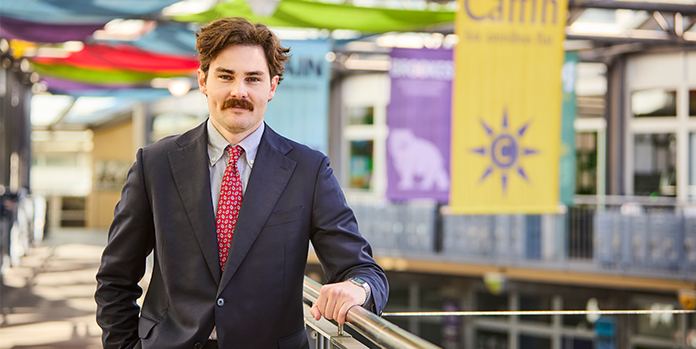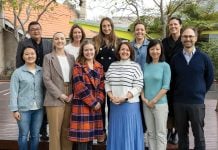Spend more than five minutes talking to Scott Williams and you’ll feel confident about the future.
When it comes to encouraging students’ interests, and the exciting possibilities they can lead to, it’s what you’d expect speaking to any teacher at Melbourne Grammar School.
But Scott isn’t an established teacher: He is currently in his first year studying a Master of Teaching at the University of Melbourne, one of the few programs in Australia that allows him to work and teach straight away as part of his studies.
As someone freshly minted to classroom teaching, it’s an impressive feat to spark genuine passion beyond just simple curiosity – especially when your subjects are classical societies, ancient history, and Latin.
“For students, the driving question for me is always why,” Scott says.
“Why do we do this in this way? Why is it considered important… And tracing that back as far as we can go.”
“You can’t understand where we are now, or even where we’re headed, without understanding everything that came before, and why. It’s a much more open-minded way of seeing and learning things.”
When tracing his own personal series of “whys” – Why teaching? Why History? Why now? – it’s clear that stepping into the classroom has been a long-held aspiration for Scott.
After completing his undergraduate studies in communications and history more than ten years ago, Scott’s career has always revolved around education: from working abroad as an English language teacher to serving locally as a library technician at both Xavier College and Melbourne Grammar School.
Through the Master of Teaching, Scott now works four-days a week as a Humanities and Latin teacher at Wadhurst.
Melbourne Grammar’s partnership with the University of Melbourne is one of many ongoing initiatives in the School’s commitment to exceptional staff.
“We see great value in supporting the next generation of teachers to become exceptional educators and providing them with the tools and support to develop their practice,” says Dorothy Tselios, Director of Human Resources.
“We partnered with Melbourne University as the Master’s program aligns with our holistic approach to education and emphasises the importance of research and evidence as a foundation for excellent educational practice.”
Scott’s placement is partially funded by the JT Morrow Education Trust, a gift established through the Will of Jack Morrow (OM 1925).
“The funding from the [JT Morrow Education] Trust is what allowed us to consider and implement this program,” says Dorothy.
Thanks to the JT Morrow Education Trust, Scott is in a unique position to bring a wealth of real-world experience into his teaching practice. Rare for a first-time teacher, and a great boon to his students.
“If you’re teaching from a position of real life, and not just what you’ve done at University — that’s going to help with the ultimate goal of education,” he says, “which is preparing students for what’s after School.”
Throughout his career and further studies – a Bachelor of Arts (Honours) in Literature and Classical Languages, a Graduate Diploma of Information Studies, and a Certificate in English Language Teaching – Scott has gained an impressive and deep catalogue of subject matter expertise.
“When I’m able to observe his Latin classes, I’m blown away at his content knowledge,” says Head of Teaching and Learning at Wadhurst, Melissa Allen.
“The facts and information he has at hand to answer questions, outside of his teaching degree, gives a phenomenal advantage to the students.”
The true impact of teaching is of course seen in the success of students.
Scott’s road to teaching might be unconventional, but thanks to Melbourne Grammar’s culture of support and additional funds from the JT Morrow Education Trust, so many students will be able to benefit from his unique career experience.
“Because I’ve spent so much of my life studying these subjects, I can bring the little details, the context, the connections that help students see the bigger picture,” says Scott.
“It’s not just about teaching them to translate; it’s about teaching them how to think.”



